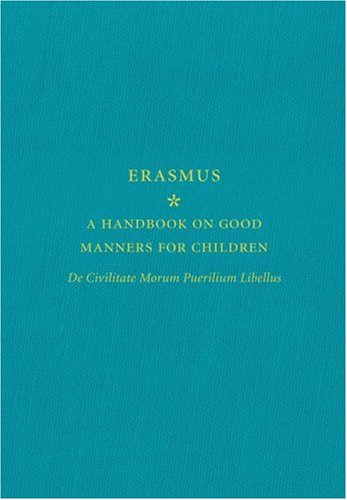Verwandte Artikel zu A Handbook on Good Manners for Children: De Civilitate...

Zu dieser ISBN ist aktuell kein Angebot verfügbar.
Alle Exemplare der Ausgabe mit dieser ISBN anzeigen:Unusual book
Die Inhaltsangabe kann sich auf eine andere Ausgabe dieses Titels beziehen.
Reseña del editor:
When did you last tell your children to put their hand over their mouth when they yawn? When did you last suggest that when they are introduced to someone they should shake hands firmly and look them in the eye? Do you suggest that they should wait until everyone is served before they eat rather than hoover up the best bit for themselves? Do you demand that your young daughter dress decorously lest she elicit outraged looks? Do you think that the children of today have disgraceful manners? Unlike, of course, when you were young ... Well, that's certainly what Erasmus of Rotterdam thought in 1530 when he published De Civilitate Morum Puerilium: A Handbook on Good Manners for Children. He felt that learning good manners was crucial to a child’s upbringing, and that the uncouth and ill-disciplined behaviour around him demanded a new kind of book. After all, as William of Wykeham memorably said in the 1350s, ‘Manners maketh man’. A Handbook on Good Manners for Children is considered to be the first treatise in Western Europe on the moral and practical education of children. It was a massive bestseller – indeed the biggest-selling book of the sixteenth century – going into 130 editions over 300 years and being translated into 22 languages within ten years of its publication. In it, Erasmus concerns himself with matters such as how to dress, how to behave at table, how to converse with one's elders and contemporaries, how to address the opposite sex and much else. For example: Table Manners ‘It’s just as rude to lick greasy fingers as it is to wipe them on your clothing, Use a cloth or napkin instead.' 'Some people, no sooner than they’ve sat down, immediately stick their hands into the dishes of food. This is the manner of wolves.' 'Making a raucous noise or shrieking intentionally when you sneeze, or showing off by carrying on sneezing on purpose, is very ill-mannered.' 'To fidget around in your seat, and to settle first on one buttock and then the next, gives the impression that you are repeatedly farting, or trying to fart.’ The advice is as relevant today as it was 500 years ago.
Biografía del autor:
This is a completely new translation – the first since Victorian times – to bring it into the new vernacular. Linguist Eleanor Merchant, BA (Oxon) MA (Lond), teaches the MRes Latin course at the Centre for Editing Lives and Letters, University of London. She is also writing her doctoral thesis on biography and translation in sixteenth-century Europe. www.eleanormerchant.com Erasmus of Rotterdam (1466/1469–1536) was a Dutch humanist, theologian and classical scholar. Widely travelled, he lived in England, France and the Low Countries. He prepared important new Latin and Greek editions of the New Testament which were influential for the Reformation. He also wrote Praise of Folly, Education of a Christian Prince, Adages, Colloquies and many other works.
„Über diesen Titel“ kann sich auf eine andere Ausgabe dieses Titels beziehen.
- VerlagPreface Publishing
- Erscheinungsdatum2008
- ISBN 10 1848091087
- ISBN 13 9781848091085
- EinbandTapa dura
- Anzahl der Seiten112
- Bewertung
(Keine Angebote verfügbar)
Buch Finden: Kaufgesuch aufgebenSie kennen Autor und Titel des Buches und finden es trotzdem nicht auf ZVAB? Dann geben Sie einen Suchauftrag auf und wir informieren Sie automatisch, sobald das Buch verfügbar ist!
Kaufgesuch aufgeben